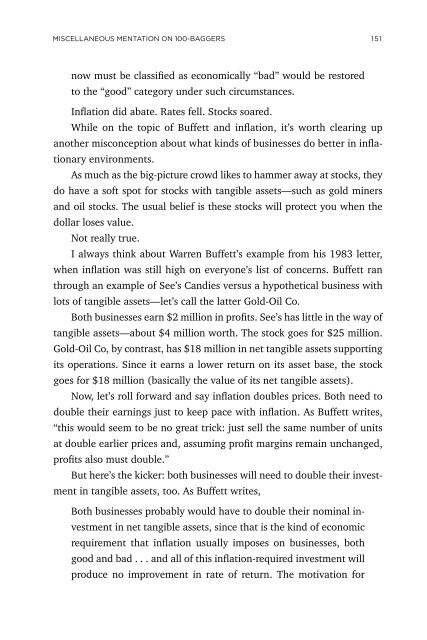You also want an ePaper? Increase the reach of your titles
YUMPU automatically turns print PDFs into web optimized ePapers that Google loves.
MISCELLANEOUS MENTATION ON 100-BAGGERS 151<br />
now must be classified as economically “bad” would be restored<br />
to the “good” category under such circumstances.<br />
Inflation did abate. Rates fell. Stocks soared.<br />
While on the topic of Buffett and inflation, it’s worth clearing up<br />
another misconception about what kinds of businesses do better in inflationary<br />
environments.<br />
As much as the big-picture crowd likes to hammer away at stocks, they<br />
do have a soft spot for stocks with tangible assets—such as gold miners<br />
and oil stocks. The usual belief is these stocks will protect you when the<br />
dollar loses value.<br />
Not really true.<br />
I always think about Warren Buffett’s example from his 1983 letter,<br />
when inflation was still high on everyone’s list of concerns. Buffett ran<br />
through an example of See’s Candies versus a hypothetical business with<br />
lots of tangible assets—let’s call the latter Gold-Oil Co.<br />
Both businesses earn $2 million in profits. See’s has little in the way of<br />
tangible assets—about $4 million worth. The stock goes for $25 million.<br />
Gold-Oil Co, by contrast, has $18 million in net tangible assets supporting<br />
its operations. Since it earns a lower return on its asset base, the stock<br />
goes for $18 million (basically the value of its net tangible assets).<br />
Now, let’s roll forward and say inflation doubles prices. Both need to<br />
double their earnings just to keep pace with inflation. As Buffett writes,<br />
“this would seem to be no great trick: just sell the same number of units<br />
at double earlier prices and, assuming profit margins remain unchanged,<br />
profits also must double.”<br />
But here’s the kicker: both businesses will need to double their investment<br />
in tangible assets, too. As Buffett writes,<br />
Both businesses probably would have to double their nominal investment<br />
in net tangible assets, since that is the kind of economic<br />
requirement that inflation usually imposes on businesses, both<br />
good and bad . . . and all of this inflation-required investment will<br />
produce no improvement in rate of return. The motivation for


